

Back to School
As summer winds down, school starts up and kids return to classrooms ready to prepare for a new year of assemblies, exams and lunchtime mayhem. It's where we spend most of our time while growing up, where we meet first loves and first friends, discovering who we are and what path we will go down.
Text by Esta Maffrett | 02.09.22
They were either the best of times or the worst depending on who you ask, but we all spent a significant part of our teen life at school. The past century has seen secondary schooling change significantly and become increasingly exam focused with the introduction of O and A Levels in 1951, GCSEs in 1986 and the National Curriculum in 1989. All the while the official school leaving age has gradually increased, from 12 in 1918 to 18 today. Despite pushes for a standardised schooling experience, our time in education remains a deeply personal and transformative experience.
School uniforms can feel so restricting, but ways to rebel and be different are passed down in playground lore from shortened ties, rolled up skirts, DIY badges and scribbled over pencil cases. Against the growing pressure to perform well in tests that make decisions for a life we can’t yet grasp, most of our time at school is spent balancing the social scenes and bubbling emotions. This time is meant to prepare us for the life ahead, but for those that don’t fit within the system’s rigid confines it can be a difficult time. The past decade has seen an increase in permanent exclusions, disproportionately affecting working class, Black and Gypsy, Roma and Traveller pupils.

With young people joining the workforce at later ages, and wider changes in life patterns, kids were in need of a place to spend those in-between hours. Youth clubs became a key part of growing up for many young people during the 20th and early 21st centuries, offering new experiences, personal development and socialising with peers. Many youth clubs could provide opportunities to take part in sports, arts and crafts, music production and kitchen skills, get advice from an adult whilst offering a free and safe space to pass the time. Hit hard by austerity cuts, a staggering 763 youth clubs have closed since 2012, and their loss is felt across the country.



















